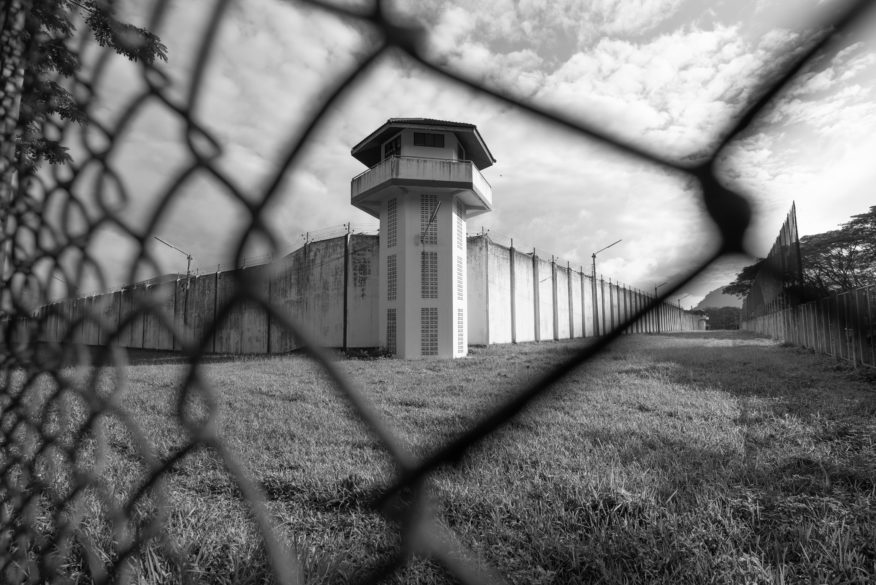By Marvin Edwards, OFS
WINONA – Imagine life confined to a cold, hard world. Your surroundings are either rough pale grey, hardened concrete or cold uninviting steel. The atmosphere is filled with constant noises of confusion, threats, danger and a madness that comes from lack of privacy. There is nothing soft in your existence, even the small bunk you have as your only escape is a thin cold plastic mat laying on a cold hard steel base. Your ears never hear a child’s laughter or a soothing response from the mouth of a mother or a spouse. A world where you have no control over your time or your space. A place where the only thing that can take you away into another world is a small bed sheet or blanket, hanging from the bunk above yours, to encase you in a confined cubicle of 3 X 6 confinement. Everything you own is stored in an eighteen-inch drawer recessed in the solid sheet of steel under your thin, narrow, plastic bed mat.
Your every movement, your every activity outside this space is limited and controlled with firm and impersonal directions. Your every word, your every expression will be judged and challenged and affect your existence that day. This is the world of incarceration.
The thought is that those incarcerated have all they need to live as a human being, the idea that they are given enough food to eat, recreational facilities to enjoy, televisions to watch, games to play and time to read and study is a false understanding of what is meant by the dignity of the person. In a normal unit of 65 plus inmates there is one TV. Time in the yard or in the gym is also very limited, to only an hour or so during a week.
There is a myth that exists in our society about the operation of our prison facilities. The name that we give to our system leads to a misunderstanding of how we deal with incarceration. We call our system “The Department of Corrections.” There is a scripture in Jerimiah 10:24 where Jerimiah pleads for correction from God. In this prayer Jerimiah asks, “Correct me, Lord, but with equity, not in anger, lest you diminish me.” Our system today is based on anger and retribution. There is a bare minimum of correctional opportunities available or redemption possible in the system as it stands. This is a sure path to ruin rather than correction. Redemption is defined as the action of regaining possession of something in exchange for payment or clearing of debt. In our system of incarceration based on punishment, the payment may be made but redemption never takes place. The wound to all affected by the crime is never healed. For true redemption to take place there must be some form of correction involved. Healing is needed by all.
In Mississippi over 19,000 individuals are incarcerated within three major state operated, 15 regional-county operated and three privately operated facilities. Mississippi is continually listed among the states with the highest rate of incarceration per capita in the U.S.

Facilities are over filled, under budgeted and understaffed. The pay rate for officers barely meets the pay standard of self-sufficiency in our state. Some work double shifts under poor conditions and tense environments. The lack of personnel and funding makes mandatory programs impossible to completely implement.
In recent years there has been a movement in our state for prison reform. Change is necessary, both financially and morally, in how we deal with crime. The failure of the process of punishment instead of correction, the cost to our tax system and the rate of recidivism demonstrates the how poorly our war on crime has worked. Crime effects more than the victim. It also affects the family of the perpetrator, the community in which the crime took place and society. Of course, redemption is the responsibility of the perpetrator, but for true redemption to take place the responsibility must be shared by all affected; the perpetrator, victim and community.
There is an opportunity for restorative justice. Restorative justice is a theory that emphasizes repairing harm caused by criminal or harmful behavior. It is best accomplished through cooperative processes that include all stakeholders. It requires a change in the way we react, solve and address crime in our society. The responsibility for redemption lies on all affected by the crime. It is thinking of crime as a violation of a relationship rather than damage to the state.
Because of the movement toward justice reform, the system has understood the need to allow concerned volunteers to aid in the effort to bring the attitude of correction to our system. Momentum can only be maintained, and correction only take place if the society promotes and supports opportunities as they are made available. Advocacy and contact with leaders of the state are essential to change.
The situation of our present system is what makes prison ministry such an important part of the success of correction within our state. Prison ministry is sometimes misunderstood in our parishes. We think that our responsibility to those incarcerated is to make the Eucharist available or to ensure the opportunity for Mass to take place. This is in no way a complete definition of prison ministry.
As Christians, we are called to build God’s kingdom in our world. Our teachings on social justices requires us as Catholics to take responsibility for the care and development of all human life. This includes those outside our circles, outside of our parishes and outside of society.
In Matthew 25, Jesus is asked; “When did we see you Lord,” He responds, “When you visited with those in prison.”
Opportunities for prison ministry abound. The ministry involves activities on the outside as well as the inside. The need is tremendous, the workers are few.
(Marvin Edwards, OFS, LEM Sacred Heart Mission, Winona MS. Coordinator of Catholic Ministry, Parchman)
